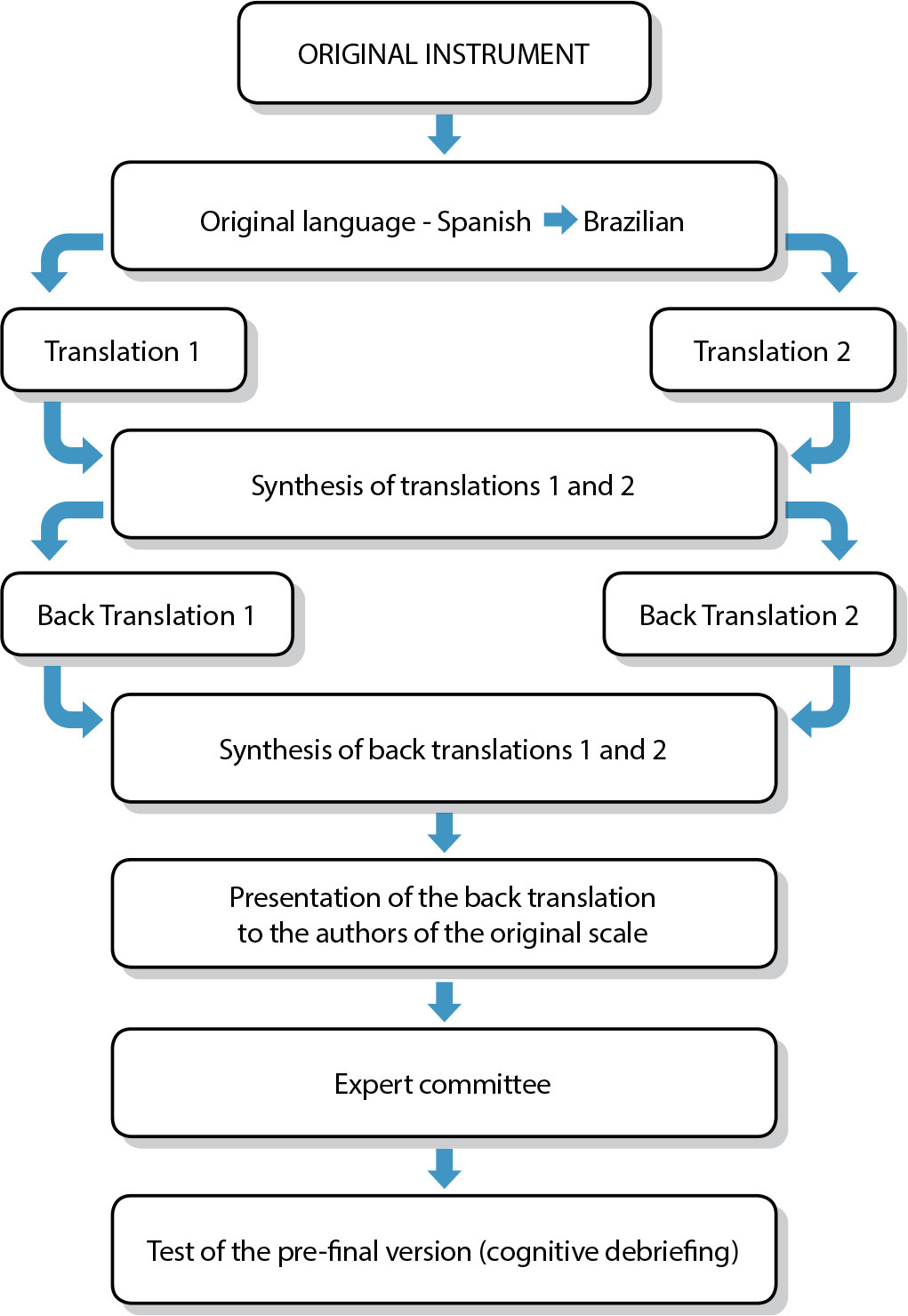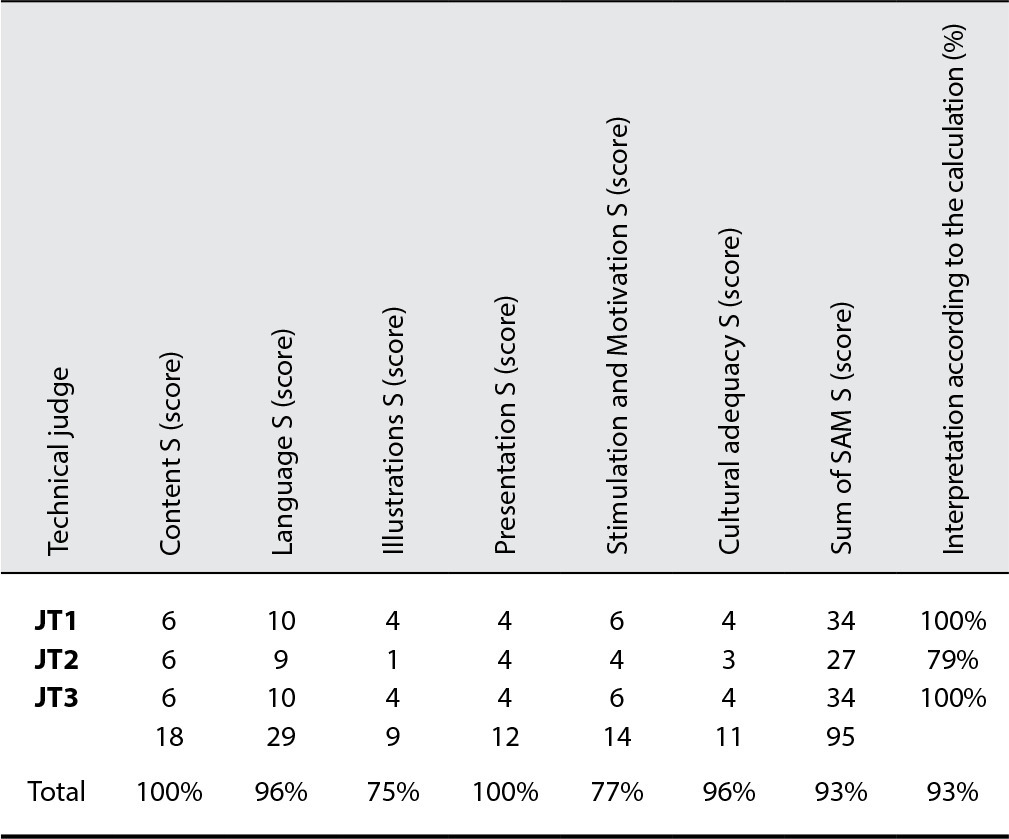-
ORIGINAL ARTICLE
RESVECH 2.0: cross-cultural adaptation for Brazil, reliability and validity for the evaluation of venous ulcers
Revista Brasileira de Enfermagem. 2023;76(2):e20220185
03-27-2023
Resumo
ORIGINAL ARTICLERESVECH 2.0: cross-cultural adaptation for Brazil, reliability and validity for the evaluation of venous ulcers
Revista Brasileira de Enfermagem. 2023;76(2):e20220185
03-27-2023DOI 10.1590/0034-7167-2022-0185
Visualizações0Ver maisABSTRACT
Objectives:
to cross-culturally adapt the scale Resultados en la valoración y evolución de la cicatrización de las heridas - RESVECH 2.0 for Brazilian Portuguese; to estimate the internal consistency and construct and criterion validity of the scale in the evaluation of venous ulcers.
Methods:
methodological study, based on international guidelines for studies of this type. Wounds were evaluated using the RESVECH 2.0 and Pressure Ulcer Scale of Healing 3.0 (PUSH). Descriptive analysis, confirmatory factor analysis, Cronbach’s alpha and Spearman’s correlation (p<0.05) were used.
Results:
12 nurses and 77 people with 153 venous ulcers participated in the study. The translation was successful, the proposed factor model was validated, and Cronbach ‘s alpha = 0.832 (95%CI, 0.780-0.880) and correlation coefficient (RESVECH 2.0 and PUSH 3.0) = 0.74 were obtained.
Conclusions:
the adaptation of RESVECH 2.0 to Brazilian Portuguese is robust. Reliability and validity show compatibility for use in the country in the evaluation of venous ulcers.

-
ORIGINAL ARTICLE
Construction and validation of educational technology for family members of people with venous ulcers
Revista Brasileira de Enfermagem. 2022;75(5):e20210555
03-28-2022
Resumo
ORIGINAL ARTICLEConstruction and validation of educational technology for family members of people with venous ulcers
Revista Brasileira de Enfermagem. 2022;75(5):e20210555
03-28-2022DOI 10.1590/0034-7167-2021-0555
Visualizações0Ver maisABSTRACT
Objective:
To build and validate an educational technology in the form of a booklet, aimed at the family members of people with venous ulcers to assist them in their care.
Methods:
A methodological study, which went through the stages of bibliographic survey and situational diagnosis for the construction of the booklet and validation of content, appearance, and adequacy with judges and the target audience. The Content Validity Index, the Suitability Assessment of Materials, and the Concordance Index were used.
Results:
In the validation with the content and appearance judges, the booklet showed an excellent overall Content Validity Index (tCVI=0.92). The technical judges evaluated the booklet as “superior” (average of 91%). The booklet underwent adjustments, and validation was performed with the target population, reaching an agreement rate higher than 75%.
Conclusion:
The educational booklet developed was validated for content and appearance and considered suitable for use by family members of people with venous ulcers.

-
ORIGINAL ARTICLE
Social representations of patients with vasculogenic ulcers about quality of life: an analysis of the social context
Revista Brasileira de Enfermagem. 2022;75(2):e20210136
10-25-2022
Resumo
ORIGINAL ARTICLESocial representations of patients with vasculogenic ulcers about quality of life: an analysis of the social context
Revista Brasileira de Enfermagem. 2022;75(2):e20210136
10-25-2022DOI 10.1590/0034-7167-2021-0136
Visualizações0Ver maisABSTRACT
Objective:
to describe the social representations of patients with vasculogenic ulcers about quality of life and analyze such representations from the social context of patients’ insertion in relation to the healthcare service.
Method:
a qualitative research, based on social representations, developed in a Family Clinic in Rio de Janeiro with 30 patients with vasculogenic ulcers for over 90 days. Data were produced through interviews and submitted to lexicographical analysis using the Alceste software.
Results:
the weaknesses of care in the healthcare service to which patients were linked contributed to exacerbate the reconfiguration of daily life that the occurrence of ulcers implies, due to the presence of pain and physical restrictions, influencing the representation of quality of life.
Final considerations:
the representation was objectified as a counterpoint to the image of “being happy”, and actions expressed proactivity in the search for a cure or passivity due to lack of clinical results.

-
REVISÃO
Treatment of venous ulcers with growth factors: systematic review and meta-analysis
Revista Brasileira de Enfermagem. 2019;72(1):200-210
01-01-2019
Resumo
REVISÃOTreatment of venous ulcers with growth factors: systematic review and meta-analysis
Revista Brasileira de Enfermagem. 2019;72(1):200-210
01-01-2019DOI 10.1590/0034-7167-2017-0865
Visualizações0ABSTRACT
Objective:
To identify evidence about the effects of growth factor application on venous ulcer healing.
Method:
Systematic review and meta-analysis, including Randomized Clinical Trials. Searches: Ovid MEDLINE, EMBASE, CINAHL, Cochrane CENTRAL, LILACS, Web of Science, Digital Library of Theses and Dissertations; Google Scholar and list of references.
Results:
802 participants were recruited from the 10 included studies: 472 in the intervention group (growth factors) and 330 as control. The relative risk for the complete healing outcome was 1.06 [95% CI 0.92-1.22], p = 0.41. Participants who received Platelet-Rich Plasma and Epidermal Growth Factor showed a slight tendency to achieve complete healing, but without statistical relevance (p <0.05). Most of the studies were classified as moderate risk of bias.
Conclusion:
The effect of the application of growth factors for complete healing in venous ulcers is not clear, and clinical trials with methodological quality are required for more accurate recommendations.
Palavras-chave: Evidence-based NursingHealingIntercellular Signaling Peptides and ProteinsNursing CareVaricose UlcerVer mais
-
REVISÃO
Impact of venous ulcers on patients’ quality of life: an integrative review
Revista Brasileira de Enfermagem. 2018;71(4):2021-2029
01-01-2018
Resumo
REVISÃOImpact of venous ulcers on patients’ quality of life: an integrative review
Revista Brasileira de Enfermagem. 2018;71(4):2021-2029
01-01-2018DOI 10.1590/0034-7167-2017-0516
Visualizações0Ver maisABSTRACT
Objective:
To analyze knowledge gathered about the impact of venous ulcers on patients' quality of life.
Method:
Systematic bibliographic review study with an integrative approach. Databases of MEDLINE, LILACS, IBECS, CINAHL Complete, Web of Science, Scopus, and CUIDEN Plus were used for selection with the PICOT guiding criteria, through the DeCS and MeSH: adult, aged, varicose ulcer, and quality of life, in Portuguese, Spanish, and English. The inclusion criteria were: full original articles available in the databases selected with adherence to the theme in Portuguese, Spanish, and English, published from 2007 to 2016.
Results:
The sample included 14 national and international articles with different methodological approaches and investigative contexts, published from 2012 to 2016.
Conclusion:
Chronic venous ulcers act on patients' bio-psycho-social-spiritual and socioeconomic spheres, having a negative impact on their quality of life.

-
RESEARCH
Application of Merleau-Pontyan perspective on the physical and psychological implications of venous ulcers
Revista Brasileira de Enfermagem. 2018;71(5):2469-2476
01-01-2018
Resumo
RESEARCHApplication of Merleau-Pontyan perspective on the physical and psychological implications of venous ulcers
Revista Brasileira de Enfermagem. 2018;71(5):2469-2476
01-01-2018DOI 10.1590/0034-7167-2017-0542
Visualizações0Ver maisABSTRACT
Objective:
to verify the application of the Merleau-Pontyan perspective on the physical and psychological implications of chronic venous ulcers in the existence of people who experience the disease.
Method:
a qualitative study, of the descriptive phenomenological type, developed with 36 patients. The field of investigation was the Outpatient Clinic of Wound Repair of the Hospital Universitário Antônio Pedro. The collection occurred from June to December 2016, through a phenomenological interview.
Results:
the experiences inherent in people who have venous ulcers pass through the world and “return” to the body itself, reflecting on the biopsychosocial aspects and the sensitivity left on the being.
Conclusion:
the biological characteristics of the subject affected by the venous ulcer have repercussions on their physical aspect, promoting influences along with the emotional and social changes originating from the clinical picture on the social aspects and consequently reverberating on the quality of life of this individual.
-
RESEARCH
Impact of home visits on the functional capacity of patients with venous ulcers
Revista Brasileira de Enfermagem. 2017;70(2):287-293
01-01-2017
Resumo
RESEARCHImpact of home visits on the functional capacity of patients with venous ulcers
Revista Brasileira de Enfermagem. 2017;70(2):287-293
01-01-2017DOI 10.1590/0034-7167-2016-0291
Visualizações0Ver maisABSTRACT
Objective:
to compare the impact of home visits, before and after instructions, on the functional capacity of adult and elderly patients with venous ulcers, by means of the KATZ-EIAVD Scale.
Method:
experimental, clinical, randomized, non-blind and controlled study, developed with 32 patients (case and control groups). The research settings were the Wound Care Clinic of the University Hospital Antonio Pedro, and the homes of patients assisted in this clinic. Data collection took place from February to June 2014, by means of a health unit evaluation tool, the KATZ-EIAVD Scale, and a script of instructions to be given to the research subjects that had received a home visit.
Results:
the studied population present excellent independence for activities of daily living, with no significant variation among them.
Conclusion:
the studied groups have functional capacity with similar progress.




